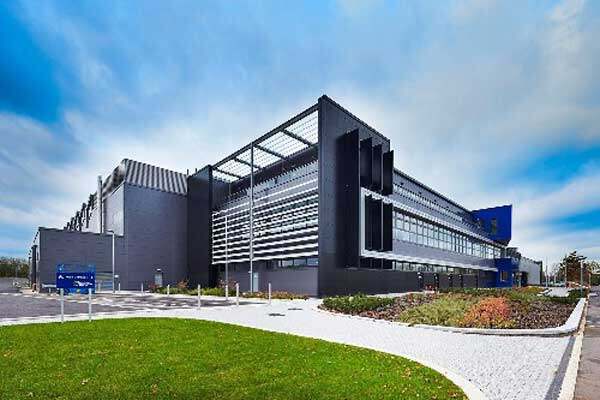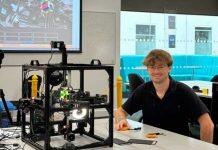The new AI Research Resource (AIRR) will serve as a national resource for researchers and industry experts spearheading AI innovation and scientific discovery – and places Bristol at the centre of the AI revolution.


Image credit: National Composites Centres (NCC)
To be known as Isambard-AI, it is expected to be the most powerful supercomputer in the UK and among the most powerful in Europe when it opens at the National Composites Centre (NCC) next year. Plans for the supercomputer were announced by the government in March, backed by a £900 million investment to transform the UK’s computing capacity and establish a dedicated AI Research Resource.
The new multi-million-pound Bristol facility will be used by a wide range of organisations from across the UK to harness the power of AI, which is already the main driver of emerging technologies like big data and robotics. The new supercomputing facility will also play a vital role inimportant areas such as accelerating automated drug discovery and climate research.
Bristol is one of the top UK universities for AI research and scientific computing. It already plays host to cutting-edge computing technology, with the Isambard 3 supercomputer due to be installed later this year to support research in AI and machine learning, while the University of Bristol is home to the UKRI Centre for Doctoral Training in Interactive Artificial Intelligence.
The Isambard-AI project is being led by Bristol experts Professor Simon McIntosh-Smith and Dr Sadaf Alam with their team in High Performance Computing (HPC), working in collaboration with the GW4 group of universities – an alliance made up of the Universities of Bath, Bristol, Cardiff and Exeter.
Simon McIntosh-Smith, Professor of High Performance Computing at the University of Bristol and project lead, said: “We’re delighted to be chosen as the site to host the UK’s first ever Artificial Intelligence Research Resource.
“Isambard-AI will be one of the world’s first, large-scale, open AI supercomputers, and builds on our expertise designing and operating cutting-edge computational facilities, such as the incoming Isambard 3.”
These next-generation capabilities are expected to put both the city and region on the global map for AI and high-performance computing (HPC), and further cement the West of England’s reputation as a place to collaborate and innovate.
Professor Phil Taylor, Pro Vice-Chancellor for Research and Enterprise at the University of Bristol, said: “AI is expected to be as important as the steam age, with ramifications across almost every area of academia and industry. Bristol’s proud to be at the forefront of this revolution.
“To be selected to host a new national AI supercomputer speaks to the University’s cutting-edge research into AI and machine learning.
“We have unique expertise in rapidly building and deploying large-scale research computing infrastructure and we’re excited to play an integral part in establishing the UK as an international hub for AI.”
Science, Innovation and Technology Secretary Michelle Donelan said: “We are backing the future of British innovation, investing in a world-leading AI Research Resource in Bristol that will catalyse scientific discovery and keep the UK at the forefront of AI development.
“The Isambard-AI cluster will be one of the most powerful supercomputers in Europe, and will help industry experts and researchers harness the game-changing potential of AI, including through the mission-critical work of our Frontier AI Taskforce.”
Dr Joanna Jenkinson MBE, Director of GW4 Alliance said: “Building on the success of the GW4 Isambard supercomputer, we are delighted the University of Bristol has been selected to develop the UK’s national AI supercomputer facility.
“GW4 Isambard started as a GW4 collaborative research community and was the world’s first Arm-based supercomputer to go into production use. Due to the success of Isambard, we secured further funding and I was pleased to attend a government delegation visit to the site of the recently announced £10m GW4 Isambard 3 facility. I am delighted the strength and innovation of GW4 Isambard and the importance of supporting academic collaboration has helped enable this national project.
“This momentous investment will supercharge our region’s digital growth and AI capabilities, hugely supporting the government’s ambitions to establish the UK as a scientific and technologic superpower.”
The NCC, based at the Bristol and Bath Business Park, is one of seven research centres across the UK that form the High Value Manufacturing Catapult, helping to turn great ideas into reality by providing access to world-class research and development facilities and expertise that would otherwise be out of reach for many businesses in the UK.
Katherine Bennett, CEO of the High Value Manufacturing Catapult, said: “This investment in Isambard AI is hugely exciting and paves the way for pioneering research with transformational potential. We are delighted that the University of Bristol and the National Composites Centre will be home to this national asset. As part of the High Value Manufacturing Catapult, the NCC is already a Centre of Excellence for digital engineering. Hosting Isambard AI will provide a springboard for continuing to accelerate the journey from digital innovation to impact.”
The UK will host the world’s first AI Safety Summit on 1 and 2 November, bringing together leading countries, technology organisations, academic and civil society to discuss the risks created or exacerbated by the most powerful AI systems, and how to address and mitigate them. The Summit will also look at how the benefits of safe AI can be unlocked to improve lives.







































